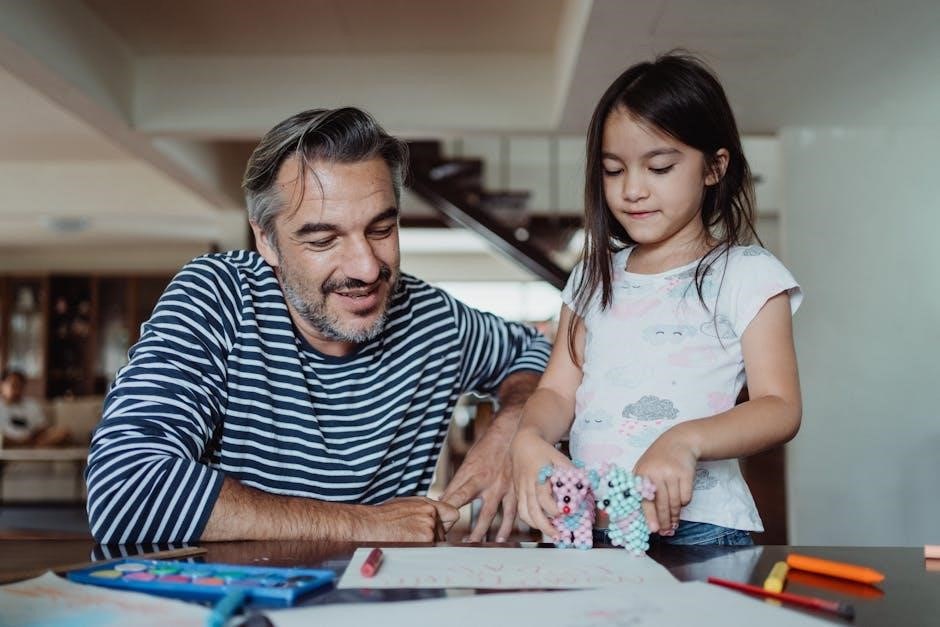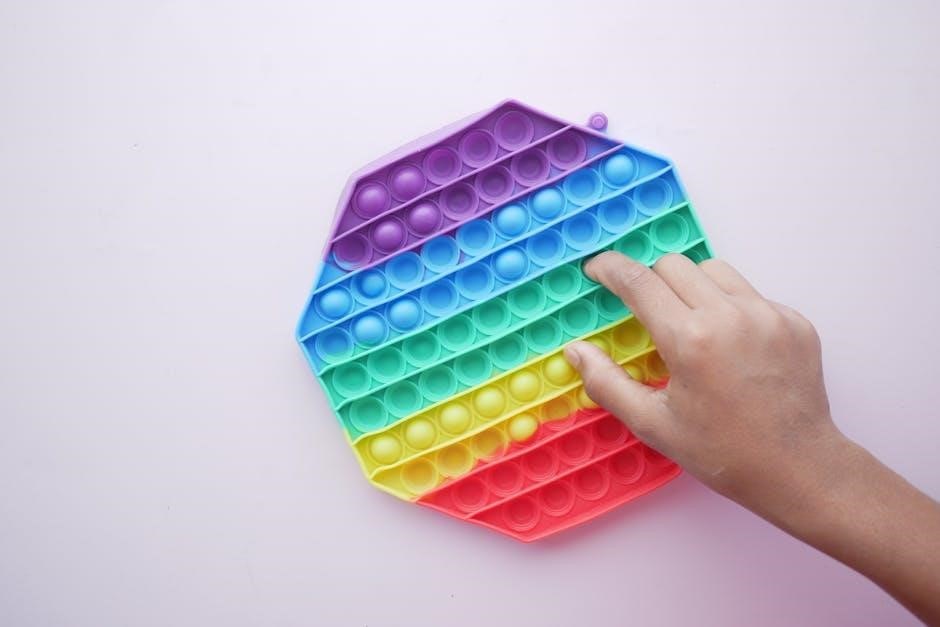Play therapy activities are helpful for children, using games and fun, with creative approaches to counseling, and are easy to make, with many benefits, and can be used in individual and group sessions, with various techniques available online.
Overview of Play Therapy
Play therapy is a type of counseling that uses play to help children express and process their emotions, with the goal of improving their mental health and well-being. This approach is based on the idea that play is a natural way for children to communicate and learn, and that it can be used to help them work through difficult emotions and experiences. Play therapy can be used to help children deal with a range of issues, including anxiety, depression, and trauma, and can be adapted to meet the needs of children of different ages and abilities. According to various online sources, play therapy has been shown to be an effective way to help children improve their emotional regulation, social skills, and academic performance. Many therapists and counselors use play therapy activities, such as games and creative exercises, to help children engage in the therapeutic process and achieve positive outcomes. Overall, play therapy is a valuable tool for helping children overcome challenges and achieve their full potential. Play therapy activities can be found in various pdf formats online.
Benefits of Play Therapy
Play therapy has numerous benefits for children, including improved emotional regulation, increased self-esteem, and enhanced social skills. Through play, children can express and process their emotions in a healthy way, leading to better mental health and well-being. Play therapy also helps children develop problem-solving skills, learn to manage stress and anxiety, and improve their relationships with others. Additionally, play therapy can help children develop a sense of control and empowerment, which can be especially important for children who have experienced trauma or adversity. Many online resources, including pdf documents, highlight the benefits of play therapy and provide guidance on how to implement play therapy activities in a therapeutic setting. By using play therapy, therapists and counselors can help children achieve positive outcomes and improve their overall quality of life. The benefits of play therapy are well-documented and widely recognized, making it a valuable tool for helping children overcome challenges and achieve their full potential; Play therapy activities can be tailored to meet the unique needs of each child, making it a highly effective and adaptable approach.

Types of Play Therapy Activities

Play therapy activities include individual and group sessions, using various techniques, with games, and creative approaches, helping children, with many online resources available, including pdf documents, for therapists and counselors to use effectively.
Individual Play Therapy Activities
Individual play therapy activities are designed to help children express and process their emotions, with a trained therapist guiding the session. These activities can include games, puzzles, and creative play, such as drawing or painting, and are tailored to the child’s specific needs and goals. According to online resources, including play therapy activities pdf documents, individual play therapy can be an effective way to help children develop self-awareness, self-regulation, and self-expression. The therapist may use various techniques, such as reflective listening and empathy, to help the child feel heard and understood. Individual play therapy activities can also help children develop problem-solving skills, learn to manage their emotions, and improve their relationships with others. With the help of a trained therapist, individual play therapy can be a powerful tool for helping children overcome challenges and achieve their full potential, and many therapists find online resources, including pdf documents, to be helpful in planning and implementing these activities.

Group Play Therapy Activities
Group play therapy activities are designed to help children develop social skills, learn to cooperate with others, and practice empathy and communication. These activities can include games, role-playing, and group projects, and are typically led by a trained therapist. According to online resources, including play therapy activities pdf documents, group play therapy can be an effective way to help children build relationships, develop conflict resolution skills, and improve their self-esteem. The therapist may use various techniques, such as group discussions and problem-solving activities, to help children learn to work together and support each other. Group play therapy activities can also help children develop leadership skills, learn to take turns, and practice sharing and cooperation. With the help of a trained therapist, group play therapy can be a fun and engaging way for children to learn and grow, and many therapists find online resources, including pdf documents, to be helpful in planning and implementing these activities, which can be adapted to meet the needs of different age groups and populations. The goal of group play therapy is to create a supportive and inclusive environment where children can feel comfortable and confident.

Examples of Play Therapy Activities
Play therapy activities include games, role-playing, and creative expressions, helping children develop social and emotional skills, with many examples available online, in play therapy activities pdf documents, for therapists to use.
Slow-Motion Activity
The slow-motion activity is a fun and engaging play therapy technique that helps children develop self-control and self-awareness. This activity involves having the child act out a scenario, such as throwing a ball or playing a game, but in slow motion. The child will engage in this slow-motion activity for one full minute, and a stopwatch can be used to time it. The slow-motion activity is a great way to help children learn about the concept of self-control and give them an opportunity to build it through play. According to Hall, Kaduson, and Schaefer, this game is an effective way to teach children about self-control and self-awareness. The slow-motion activity can be used in individual and group sessions, and it is a great addition to any play therapy activities pdf document. This activity is easy to implement and requires minimal materials, making it a great option for therapists to use in their practice. The slow-motion activity is a valuable tool for helping children develop essential life skills, and it can be used in conjunction with other play therapy techniques to create a comprehensive treatment plan.
Play Therapy with Sand Trays
Play therapy with sand trays is a popular and effective technique used in play therapy activities pdf. This method involves using a sand tray filled with sand and miniature objects, such as toys, rocks, and shells, to create a three-dimensional scene. The child is encouraged to use their imagination and creativity to build and create a world in the sand tray, allowing them to express their thoughts and feelings in a non-verbal way. The therapist can use the sand tray to help the child process and work through difficult emotions and experiences, and to identify patterns and themes in their behavior. According to experts, play therapy with sand trays can be a powerful tool for helping children overcome trauma, anxiety, and other emotional challenges. The sand tray can be used in individual and group sessions, and can be adapted to meet the needs of children of different ages and abilities. By using play therapy with sand trays, therapists can create a safe and supportive environment for children to explore and express themselves. This technique is widely used in play therapy and is considered an essential part of many play therapy activities pdf documents.
Play Therapy with Board Games
Play therapy with board games is a fun and engaging way to help children develop social and emotional skills. Many play therapy activities pdf documents include board games as a key component of therapy, as they provide a structured and interactive way for children to learn and grow. Therapists can use board games to teach children important skills such as turn-taking, sharing, and good sportsmanship, as well as to help them develop problem-solving and critical thinking abilities. Board games can also be used to help children process and work through difficult emotions, such as anxiety and anger, in a safe and supportive environment. According to experts, play therapy with board games can be an effective way to help children build self-esteem and confidence, and to develop healthier relationships with others. By incorporating board games into play therapy, therapists can create a fun and engaging experience for children, while also helping them to develop important social and emotional skills. This approach is widely used in play therapy and is considered an essential part of many play therapy activities pdf documents, providing a valuable resource for therapists and children alike.
Play therapy activities are beneficial, with many resources available, including play therapy activities pdf, providing therapists with tools to help children develop and grow in a fun and engaging way always online.
Importance of Play Therapy Activities
Play therapy activities are essential for the emotional and psychological development of children, as they provide a safe and supportive environment for kids to express themselves. The importance of play therapy activities lies in their ability to help children develop social skills, manage emotions, and build self-esteem. Through play therapy activities, children can learn to communicate effectively, resolve conflicts, and develop problem-solving skills. Additionally, play therapy activities can help children overcome traumatic experiences, anxiety, and depression. The use of play therapy activities pdf can provide therapists with a wide range of tools and techniques to help children overcome various challenges. By incorporating play therapy activities into their practice, therapists can create a fun and engaging experience for children, helping them to develop and grow in a positive and supportive environment. Overall, the importance of play therapy activities cannot be overstated, as they play a critical role in promoting the emotional and psychological well-being of children.